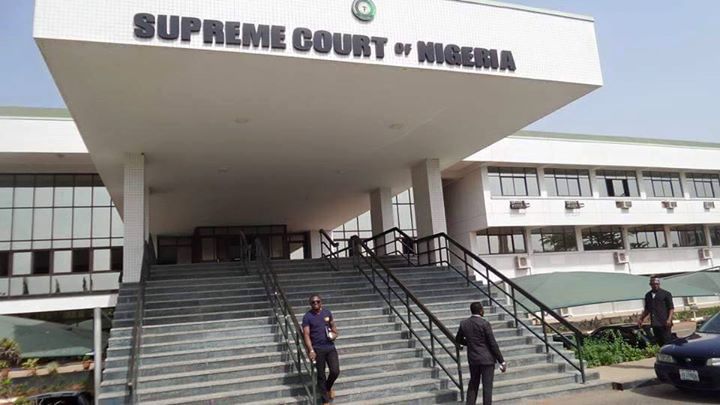JUDICIARY: History of Nigeria's Legal System and the Supreme Court

Did you know that the first Supreme Court was established in 1863 by the Supreme Court Ordinance 1863, and that with the adoption of the 1954 Constitution, a Federal Supreme Court was established which later became the Supreme Court of Nigeria in 1963?
The Supreme Court of Nigeria (SCN) is the highest court in Nigeria. It is located in the Federal Capital Territory's Central District, Abuja, in what is known as the Three Arms Zone, so called due to the proximity of the offices of the Presidential Complex, the National Assembly, and the Supreme Court.
Historically, each of the territories that constitute Nigeria had a legal system long before colonization. In the period before 1862, the laws administered in most of the areas in present northern Nigeria was the Muslim law of the Maliki school. These laws were administered through the Alkali courts by the Alkali, knowledgeable Islamic scholars. The south had unwritten customary law.
Law is dynamic, continually changing to fit the needs of whatever society it exists in. When the trading coastal areas like Lagos, Benin, Bonny, Brass, New Calabar (now Degema) and Old Calabar (now Calabar) had indigenous citizens who had disputes with foreigners, the indigenous court system was not enough to settle such disputes. The foreigners often felt like they rarely obtained justice and so there was the need for the justice administration system to be improved.
In 1849, the British government appointed the first consul in Nigeria. The consuls were to settle trade disputes between the indigenes and foreigners and they established equity courts and consular courts. The British government made Lagos a colony is 1862, introducing English laws which were to be administered by some established courts.
The first Supreme Court was established in 1863 by the Supreme Court Ordinance 1863. Other courts that were established were the Court of Civil and Criminal Justice which replaced the Supreme Court and the West African Court of Appeal. A number of other courts were established before 1874 and in 1876, the Supreme Court Ordinance 1876 established a new supreme court which was to administer the common law of England, the doctrines of equity, and the statutes of general application in force in 1876.
The Supreme Court was made up of the Full Court which served as a court of appeal, the Divisional Courts with both original and appellate jurisdiction, and the District Commissioners’ Courts. Appeals from the District Commissioners’ Court went to the Divisional Courts while the appeals from the decisions of the Divisional Courts went to the Full Court. The received English law was in force simultaneously with the customary laws as the Full Court held in Oppon v. Ackinie that customary law was still valid.
A number of British firms traded along the banks of River Niger and one of such was the National African Company which received a Royal Charter in 1886 and later had its name changed to the Royal Niger Company. The company was empowered to administer justice in the territories it operated in while giving due regard to the indigenous laws and customs until its charter was revoked in 1899.
The territories that now constitute southern Nigeria were amalgamated by the Southern Nigeria Order in Council 1899 which took effect on the 1st of January, 1900. The Order provided for the appointment of a high commissioner who was empowered to make laws for the protectorate through proclamations. The high commissioner established a Supreme Court through the Supreme Court Proclamation 1900 and the Supreme Court was to administer the common law of England, the doctrines of equity and the statutes of general application in force in England on 1st of January, 1900.
Courts were established through the Native Courts Proclamation 1900 to administer the customary laws which were previously administered by the indigenous courts. In any jurisdiction where a native court had been established, no indigenous court could be in force as the native courts exercised their jurisdiction exclusively. The native court system has been said to have been a failure.
A High Commissioner was also established for the protectorate of Northern Nigeria who established a Supreme Court, provincial courts and cantonment courts through the Protectorate Courts Proclamation 1900. The Native Courts were established by a separate proclamation which was the Native Courts Proclamation 1900. It should be noted that the native court system fared better in the north than it did in the south. While the indigenes were allowed to appoint the heads of their native courts, no such privileges were given to the southerners.
In 1914, the colony and protectorate of southern Nigeria was amalgamated with the protectorate of northern Nigeria to form the colony and protectorate of Nigeria. Three types of courts were established for the country which were the Supreme Court, the Provincial courts and the native courts. The Supreme Court was similar to the one established in both the north and south in 1900, applying the common law of England, doctrines of equity and the statutes of general application in force in England on the 1st of January, 1900. It had civil and criminal jurisdiction. The provincial courts had civil and criminal jurisdiction, with appeals from its civil decisions going to the Supreme court while there was no opportunity to appeal its decision in criminal cases.
The provincial courts were widely criticized as it did not make provision for legal representation and the courts were manned by administrative personnel instead of judicial personnel and they could hardly be expected to deliver justice properly. While the government claimed that it was to enable litigants get justice cheaply, there is no point in it being cheap if justice cannot be gotten, especially since the decision of the provincial courts could not be appealed in criminal cases.
The judicial system attracted so much criticism that in 1933, the Protectorate Courts Ordinance 1933 established a High Court and Magistrates’ courts for the protectorate. The high court had practically the same jurisdiction as the Supreme court, except that only the Supreme Court had jurisdiction in probate, divorce and matrimonial cases, admiralty cases and proceedings under specified Ordinances. The decisions of the high court and supreme court could be appealed to the west African court of appeal. The jurisdiction of the native courts was also increased.
The 1954 constitution was the first truly federal constitution, with Nigeria being a federation consisting of three regions. A Federal Supreme Court was established. There was also a High Court for each region and Lagos. A magistrates’ court was established for each region and appeals from the courts went to the High Court of that region. There were also statutory courts which were known as Customary Courts in the eastern and western region and native Courts in the northern region. The northern region had a customary court of appeal which was known as the Moslem Court of Appeal and was to entertain appeals from the native courts in civil and criminal cases where Moslem law was applied. The Sharia Court of Appeal was established in 1960 to replace the Moslem Court of Appeal.
Even though Nigeria gained independence in 1960, the Privy council still remained the highest court of the country, entertaining appeals from the Federal Supreme Court. In 1963, the Federal Republic of Nigeria was proclaimed and Nnamdi Azikiwe became its first President. Appeals from the Federal Supreme Court to the Judicial Committee of the Privy Council were abolished at that point, and the Supreme Court became the highest court in Nigeria.
In 1976, the Court of Appeal (originally known as the Federal Court of Appeal) was established as a national court to entertain appeals from the High Courts of each of Nigeria's 36 states, which are the trial courts of general jurisdiction. The Supreme Court in its current form was shaped by the Supreme Court Act of 1990 and by Chapter VII of the 1999 Constitution of Nigeria.
Under the 1999 constitution, the Supreme Court has both original and appellate jurisdictions, has the sole authority and jurisdiction to entertain appeals from Court of Appeal, having appellate jurisdiction over all lower federal courts and highest state courts. Decisions rendered by the court are binding on all courts in Nigeria except the Supreme Court itself.
The Supreme Court is composed of the Chief Justice of Nigeria (CJN) and such number of justices not more than 21, appointed by the President on the recommendation of the National Judicial Council, (NJC) and subject to confirmation by the Senate. Justices of the Supreme Court must be qualified to practice law in Nigeria, and must have been so qualified for a period not less than fifteen years. Justices of the Supreme Court of Nigeria have a mandatory retirement age of 70 years.
Sources: Learn Nigerian Law | Wikipedia



